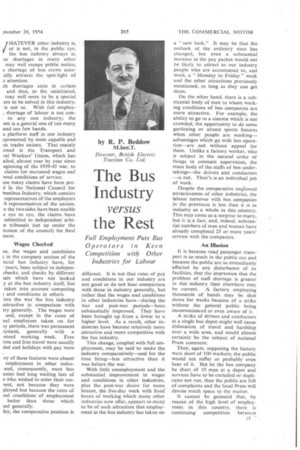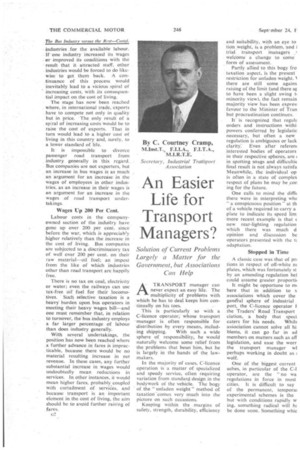The Bus Industry
Page 115

Page 116

If you've noticed an error in this article please click here to report it so we can fix it.
versus
the Rest
Full Employment Puts Bus Operators in Keen Competition wittt Other Industries for Labour
iHATEVER other industry is, or is not, in the public eye, the bus industry always is. ur shortages in many other may well escape public notice, k. shortage of bus crews auto;ally attracts the spot-light of
c attention.
ch shortages exist in certain and thus, /o the uninitiated, may well seem to be a special ern to be solved in this industry. is not so. With full employ, shortage of labour is not conto any one industry; the e m is a general one of too many and too few hands.
e platform staff in our industry epresented by most capable and us trades unions. That mainly ;rned is the Transport and ral Workers' Union, which has ailed, almost year by year since eginning of the 1939-45 war, to claims for increased wages and wed conditions of service.
e,se many claims have been pre d to the National Council for Imnibus Industry, which consists representatives of the employers 6 representatives of the unions. .e the two sides have been unable e eye to eye, the claims ,have submitted to independent arbin tribunals (set up •under the itution of the council) for final ment.
Wages Checked us, the wages and conditions ; in the company section of the ncial bus industry have, for years, been subject to indepenchecks, and checks by different la's which have not looked y at the bus industry itself, but taken into account competing ; and conditions in others.
:ore the war the bus industry attractive in comparison with try generally. The wages were and, except in the cases of nal employees taken on for q periods, there was permanent )yment, generally with a .nteed working week. Free rms and free travel were usually ded and holidays with pay were ny of these features were absent employment in other indusand, consequently, most bus anies had long waiting lists of e who wished to enter their emlent, not because they were ployed but because the rates of Ind conditions of employment better than those which led generally.
lay, the comparative position is different. It is not that rates of pay and conditions in our industry are not good or do not bear comparison with those in industry generally, but rather that the wages and conditions in other industries have—during the war and post-war periods—been substantially improved. They have been brought up from a lower to a higher level. As a result, other industries have become relatively more attractive and more competitive with the bus industry.
This change, coupled with full employment, may be said to make the industry comparatively—and for the time being—less attractive than it was before the war.
With little unemployment and the substantial improvement in wages and conditions in other industries, plus the post-war desire for more leisure, the five-day week with fixed hours of working which many other industries now offer, appears to many to be of such attraction that employment in the bus industry has taken on a "new look." It may be that the outlook of the ordinary man has changed, but even a substantial increase in the pay packet would not be likely to attract to our industry people who are accustomed to, and want, a Monday to Friday" week and the other attractions previously mentioned, as long as they can get them.
On the other hand, there is a substantial body of men to whom working conditions of bus companies are more attractive. For example, the ability to go to a cinema which is not crowded, the opportunity to do some gardening or attend sports fixtures when other people are working— advantages which go with bus operation—are not without appeal for them. Unlike a factory worker, who is subject in the natural order of things to constant supervision, the main body of the staffs of bus undertakings—the drivers and conductors —is not. Their's is an individual job of work.
Despite the comparative imp-roved attractiveness of other industries, the labour turnover with bus companies in the provinces is less than it is in industry as a whole in this country. This may come as a surprise to many, but it ia a fact, and, indeed, substantial numbers of men and women have already completed 25 or more years' service with the companies.
An Elusion It is because road passenger transport is so much in the public eye and because the public are so immediately affected by any disturbance of its facilities, that the impression that the problem of staff shortage is greater in this industry than elsewhere may be current. A factory employing thousands of hands may be shut down for weeks because of a strike without the general public being inconvenienced or even aware of it.
A strike of drivers and conductors at a single bus depot might well cause dislocation of travel and hardship over a wide area, and would almost certainly be the subject of national Press comment.
Then, again, supposing the factory were short of 100 workers; the public would not suffer or probably even hear of it. But let the bus company be short of 10 men at a depot and services have to be curtailed or duplicates not run, then the public are full of complaints and the local Press will devote much space to the matter.
It cannot be gainsaid that, by reason of the high level of employment in this country, there is continuing competition betwcon industries for the available labour. If one industry increased its wages r improved its conditions with the result that it attracted staff, other industries would be forced to do likewise to get them back. A continuance of this process would inevitably lead to a vicious spiral of increasing costs, with its consequential impact on the cost of living. The stage has now been reached • where, in international trade, exports have to compete not only in quality . but in price. The only result of a spiral of increasing costs would be to raise the cost of exports. That in turn would lead to a higher cost of living in this country and, surely, to a lower standard of life.
It is impossible to divorce passenger road transport from industry generally in this regard. Bus companies are not exporters, but an increase in bus wages is as much an argument for an increase in the wages of employees in other industries, as an increase in their wages is an argument for an increase in the wages of road transport undertakings.
Wages Up 200 Per Cent.
Labour costs in the companyowned section of the industry have
gone up over 200 per cent, since
before the war, which is appreciably higher relatively than the increase in the cost of living. Bus companies are subjected to a discriminatory tax of well over 200 per cent. on their raw material—oil fuel; an impost from the like of which industries other than road transport are happily free.
There is no tax on coal, electricity or water; even the railways can use tax-free oil fuel for their locomotives. Such selective taxation is a heavy burden upon bus operators in meeting their heavy wages bill—and one must remember that, in relation to turnover, the bus industry employs a far larger percentage of labour than does industry generally.
With several undertakings, the position has now been reached where . a further advance in fares is impracticable, because there would be no material resulting increase in net revenue. In these cases, any further substantial increase in .wages would undoubtedly mean reductions in services. In other instances, it would mean higher fares, probably coupled with curtailment of servides, and because transport is an important element in the cost of living, the aim should be to avoid further raising of fares.
























































































































































































































































































































